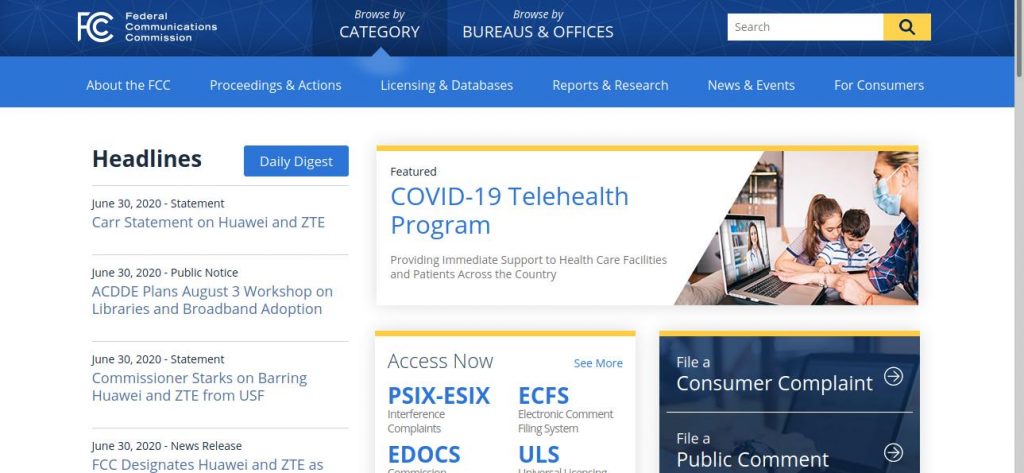Since Donald Trump assumed the presidency of the United States, various officials have made accusations against Chinese companies for espionage. Today, those accusations acquired a new entity because the Federal Communications Commission (FCC) classified two of them as "threats to national security".
In recent years, the FCC has made proposals against Huawei and ZTE, Well now it's official: The commission has passed an order officially declaring the two Chinese tech giants as threats to national security U.S..
The agency incriminated the companies as agents of the Chinese government thanks to their estrong political ties, the legal obligation to cooperate with Chinese covert espionage operations, vulnerabilities in its software and network hardware that could allow data to be directed to Beijing, and its trade sanctions violations of the US against Iran and North Korea.
The declaration ends a federal process to exclude and purge Huawei and ZTE products from the wireless network, especially in rural regions. The US is also pressuring other governments, including the UK, to do the same.
In November, the FCC issued an order for eprevent domestic communications service providers from receiving grants from the Universal Service Fund to buy Huawei and ZTE products. The latest order basically consolidates that ban.
Commissioner Geoffrey Starks of the opposition Democratic Party stated that he agreed with the order and is advocating for Congress to approve funding for companies to replace Chinese network equipment.
Why do they declare Chinese companies as threats
The Federal Communications Commission noted that the Huawei's founder, Ren Zhengfei, had been the director of the Chinese People's Liberation Army (EPL), the Chinese armed forces. and that former Huawei employees had provided evidence showing that Huawei provided network services to an entity that is considered an elite cyberwarfare unit within the PLA. It was also taken into account that Huawei received large subsidies from the Chinese Government
On the other hand, the FCC noted that lhe Chinese laws oblige their companies to cooperate with any request from the Chinese government to use or access their intelligence and surveillance systems.
Nor are they cut when it comes to qualifying the government of the eastern country. The documentation talks about:
… The authoritarian nature of that government, the lack of sufficient judicial controls and its record of industrial espionage.
The Government of China is highly centralized and exercises strong control over business entities in its sphere of influence, allowing the Government, including state intelligence agencies, to require private sector communications entities to cooperate with requests from the Government, including disclosure of information about customers and network traffic.
The demands for that information pThey could come in the form of legal pressure, as in the case of China's National Intelligence Law, or in the form of extra-legal political pressure exerted by controlling grant funding, employee unions, or threats and / or coercion. .
The resolution against ZTE, published in a separate document could be a copy paste since the arguments are the same. Unless ZTE has closer government ties.
ZTE originated from the Aerospace Ministry, a Chinese government agency, and It is owned in part by the Chinese government. Furthermore, ZTE serves a hybrid of "business and military needs," and much of its property is in the hands of state-owned companies. On the other hand, Chinese law requires that there be an internal Communist Party Committee.
In 2018 ZTE pleaded guilty to violating United States sanctions by sendingar approximately $ 32 million of US goods to Iran and obstruct the investigation of the Department of Justice. He also pleaded guilty to participate in a multi-year conspiracy to supply, build and operate telecommunications networks using equipment of American origin in violation of the United States trade embargo against Iran, and of committing hundreds of violations of the United States sanctions related to the shipment of telecommunications equipment. In addition, the company accepted hmade false statements and obstructed justice by creating an elaborate plan to prevent the disclosure of information to and misleading the United States Government.

There is a lot of hypocrisy on the part of the US: Giants like Microsoft are obliged to hand over the source code to the NSA (to make it God knows what) and nobody claims them for that. The US claims to defend the free market and freedom of business, but provided that they impose all the rules of the game and can violate them with absolute impunity.
In the USA there is no free market, and many organizations are autonomous. We must stop seeing the USA as the benchmark of capitalism, because it is not.
And China has no freedom from anything at all.